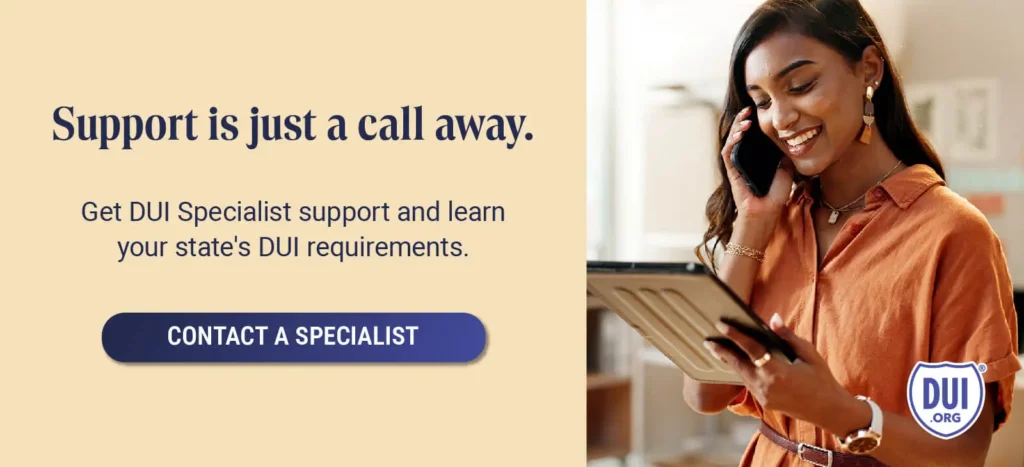
A DUI charge can bring a whirlwind of emotions for both the person involved and their loved ones. Feelings of anger, guilt, shame, and frustration can surface, creating stress and uncertainty.
As a supportive partner, there are ways to help navigate this difficult period and foster a positive environment for healing. We’ve consulted with Brian T. Davis, a Licensed Independent Social Worker and a Substance Abuse Professional to outline five key steps you can take to support your partner after a DUI.
1. Provide emotional support
Your partner is likely working through a lot of negative feelings after their DUI charge and may be overwhelmed with the legal steps ahead of them. Make a conscious effort to be a safe space for them to share their emotions and thoughts.
Check in regularly to see if they need to talk, and listen actively without judgment, setting aside your own thoughts and feelings so they can be open and honest.
If you find yourself feeling frustrated or even angry towards your partner, recognize that this can be normal. You might try to get support for yourself first so you can approach them with greater empathy. It may also be important to express your own feelings in a constructive way.
Taking turns listening might mean you agree to share feelings in separate conversations to avoid the intensity and conflict that can come from a topic where both of you may have high emotions and a need to be heard.
2. Limit risk factors and triggers
One significant way you can support your partner is by helping to avoid the environments and situations that may have led to the DUI.
Plan ahead for how to get home from an event if you both plan to drink. If certain friends tend to encourage drinking and driving, limit interactions with them or suggest sober activities as alternatives. Committing to a wellness challenge together can also help your partner make better decisions about drinking.
3. Seek professional help
If you suspect a deeper issue with alcohol use, encourage your partner to seek treatment. Research local treatment providers, support groups, and other resources together. You may also want to explore programs designed for couples to help both of you navigate this challenge.
If your partner isn’t ready or open to conversations about professional help, realize that coming off pushy or preachy could backfire. You can continue learning on your own and wait until your partner shows openness.
If your partner has not been open to seeking professional help and you think there is a concern for their safety or other family members, you can enlist the help of a professional yourself to consider your options in approaching your partner.
TV shows have made “interventions” a popular approach to professional help but realize there are less dramatic approaches.
You may also benefit from finding a professional who takes less of a made-for-TV approach. An “open family intervention” with no surprise or secret meetings can often be equally effective to help your partner consider getting more help.
This can be a serious engagement. If you call a professional to talk about this, prepare a list of questions in advance to interview the professional and then call at least one other professional to compare their approach.

4. Take time for yourself
Coping with a DUI can be a stressful time for both you and your partner, so it's important to practice self-care. Schedule time to reset and recharge with an activity or hobby you enjoy. Seek out support for yourself as well, whether it's through trusted family or friends or a licensed counselor who can help you process your emotions.
5. Make driving arrangements
Depending on the local DUI laws, your partner may face a period of license suspension. Work together to plan transportation alternatives if they're unable to drive. Some options include public transit, ride share apps, or getting help from family and friends.
Contact our DUI Specialists
Unsure where to start after a DUI? Our State Specialists are ready to help you or your loved one meet all the driving requirements, like IIDs and SR-22 insurance. Call us today and let us guide you toward getting back behind the wheel.
We understand that mistakes happen, and we're committed to providing non-judgmental service so our customers can safely get back on the road.
Facing a DUI can be a challenging and emotional journey, but with compassion, support, and practical planning, you and your partner can navigate this period successfully. Lean on the resources available and take proactive steps to come out stronger together.
For more assistance visit:
- New Directions Assessments: https://ndassessments.com/
- Directions Counseling & Coaching: https://www.directionscounseling.com/
About the Co-Author
Brian Davis is the Founder and Executive Director of Directions Counseling & Coaching in Powell Ohio and New Directions Assessments, a national mental health and substance use assessment website service. His teams enlist the talent, compassion, and experience of over 35 therapists and coaches who have been providing assessment, therapy, and coaching services to individuals, children, families, companies, and courts nationwide for over 30 years.
Get support.
What is next? We can help you through the process. Give us a little information and we can support you through the next steps.
All fields are required.